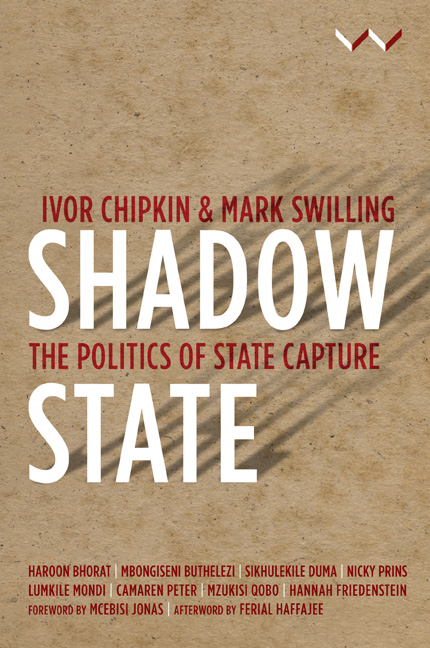Book contents
- Frontmatter
- Contents
- List of figures and tables
- Acronyms and abbreviations
- Key terms
- Acknowledgements
- Foreword
- Prologue
- Introduction
- Chapter 1 Structuring the Capture of the State
- Chapter 2 The Politics of Betrayal
- Chapter 3 Power, Authority and Audacity: How the Shadow State Was Built
- Chapter 4 Repurposing Governance
- Chapter 5 Conclusion
- Afterword
- Contributors
- Index
Chapter 1 - Structuring the Capture of the State
Published online by Cambridge University Press: 17 May 2019
- Frontmatter
- Contents
- List of figures and tables
- Acronyms and abbreviations
- Key terms
- Acknowledgements
- Foreword
- Prologue
- Introduction
- Chapter 1 Structuring the Capture of the State
- Chapter 2 The Politics of Betrayal
- Chapter 3 Power, Authority and Audacity: How the Shadow State Was Built
- Chapter 4 Repurposing Governance
- Chapter 5 Conclusion
- Afterword
- Contributors
- Index
Summary
The nexus between the constitutional and shadow states depends on the integration of a range of skills similar to those present in most international corporations. The composition of the Zuma-centred power elite is, in many respects, highly organised, following the structure of what, in academic terms, is called a ‘war economy’. In a war economy the ‘shadow state’ establishes a number of informal structures which produce systems of ‘profit, power and protection’ that, in turn, serve to further their operations, making possible continued preferential access to resources and power through an exploitative economic system. The cycle can, therefore, continue.
One of the key requirements in establishing these shadow structures is the ability to secure a system of command and control over the way the resources are accessed, moved and distributed. At the outset, control must be established over the sources of extraction, including the ability to respond flexibly to any changes in the operating environment. Once access to the source of extraction is secured, networks of middlemen or brokers must be established that can move resources externally, usually transnationally, to sustain loyalty (this is critical to ensuring the survival of the network). The ability to transact within this network is facilitated by establishing political marketplaces where support is traded through the provision of access to resources.
The skills of this patronage network are localised within a number of groups. The networks consist of three elements: the controllers, the elites and the entrepreneurs (also known as brokers), as shown in Figure 1.1.
The controllers, or patrons, of resources sit at the apex and are usually the strongmen directly responsible for predation and exploitation. Their function is to secure access to and maintain control over resources. A patron or controller typically favours one group over another (or others), resulting in the exclusion of those who are out of favour. This sets up a competitive set of nodes around the patron or controller, which has the ultimate effect of rendering elites (the next layer down) unable to cooperate effectively as they fear being ousted by their partners, or falling out of favour with the patron. Jacob Zuma and the Guptas have been controllers.
- Type
- Chapter
- Information
- Shadow StateThe Politics of State Capture, pp. 19 - 28Publisher: Wits University PressPrint publication year: 2018



